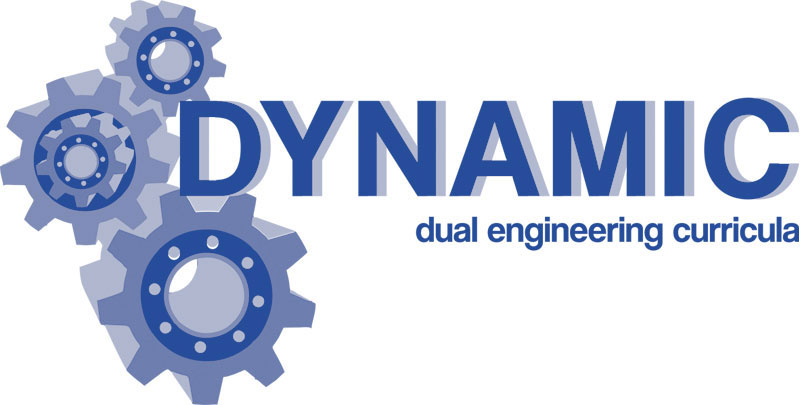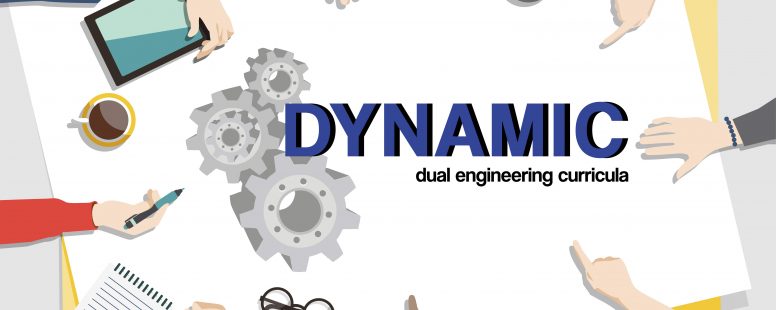Within the project DYNAMIC, academic and industrial experts from 16 partner organisation in 5 EU countries came together to jointly design and implement practice-integrated dual education models that are feasible for the country-specific conditions and regional needs. We would like to share with you some of lessons we have learnt from the past 3 years of international cooperation and invite you to join us in our future endeavours to promote and further develop dual higher education.
The aim of the DYNAMIC project was to develop, implement, and evaluate three practice-integrated dual undergraduate engineering programmes in Bulgaria, Romania and Croatia. The courses of study identified for the pilot project reflect the domains of strategic importance for the regions, in which the academic and industrial partners are located. Therefore, the following programmes were selected for adaptation in dual form: Mechatronics and Robotics, Shipbuilding and Construction and Mechanical Engineering and Production. Experience was shared from Germany and Austria, with knowledge drawn from two existing programmes: Mechanical Engineering and Production Technology and Organisation. The curriculum development process followed a participatory co-development approach involving the key stakeholders from academia, business, chambers of commerce and industry as well as through consultations with the students concerned. Regional working groups were formed comprising of one university working with two enterprises and a chamber of commerce and industry for each country of the pilot implementation.
The activities in the DYNAMIC project were organised around the development, preparation, implementation and evaluation of the dual pilot programmes in the field of engineering. National focus groups of key stakeholders worked on the adaptation of ongoing engineering curricula according to identified industry training needs, development of the syllabuses for practical i n-company training activities and elaboration of a coordinated implementation plan. To ensure the successful implementation of the pilot dual programmes, the project has developed a toolkit for documentation and assessment of the practical training for use by academic supervisors. To strengthen the training capacity and capabilities of the enterprises involved in dual education, the project also offered training for industrial mentors. The evaluation outcomes of the curriculum adaptation and implementation processes are reflected in the “Methodological guidelines for design and implementation of practice-integrated dual higher education programmes in engineering studies” in the context of Bulgaria, Romania and Croatia.
The curriculum adaptation process in the three partner universities has been conducted jointly based on the requirements of the industrial partners. All adaptations had to adhere to the regulations of the national accreditation bodies. Once certain pertinent specialty subjects were selected, syllabuses for the practical learning components in the companies were designed and supplementary hours for these practical activities allocated/assigned.
In order to ensure a high-quality learning experience of the students and to facilitate the smooth mentoring process during their placements, a Toolkit for implementation and documentation of dual higher education programmes has been developed. The toolkit consists of templates and necessary standardised documents – student diary and practice report, checklists for evaluation and assessment of the student performance, company visit procedures, a feedback questionnaire for the student, application form for a bachelor thesis etc.
A specialised training course for industrial mentors has been developed and implemented by the German-Romanian and German-Bulgarian Chamber of Commerce and Industry. The training gives the participants (existing or new student placement mentors) the pedagogical competency at the level required by the German System.
Customised training materials, considering the specifics of the higher education sector, have been developed and integrated into the training offering for enterprises. This training specifies how both pedagogical and professional skills can be combined with activity-based and process-oriented content. It also informs participants of the methods of training available to them, with particular attention given to didactical conversation and to the on-the-job session.
The DYNAMIC project has demonstrated that the driving force for the successful implementation of dual higher education is a relationship of trust and good cooperation between universities and their partner companies. The evaluation of the DYNAMIC pilot dual programmes indicates that the flexibilisation of higher education through integration of company-based learning components is possible but warns that the process can be slow. It confirms that the broader education challenge, of ongoing curricula allowing for only moderate changes or adaptations, can be addressed with maximised impact if programmes are designed as dual studies. The project also shows, however, that a political support to the transformative agenda, in the form of an appropriate regulatory framework, is necessary if we are to establish quality assurance measures, transparency and certification of dual higher education over the medium-term.
Employability considerations and providing engineering graduates with the most appropriate skills needed for carrying out their future jobs in the most promising sectors of manufacturing requires new methods and mechanisms if higher education institutions are to be the most relevant places of production of learning that is expected of them. The DYNAMIC project suggest that dual studies at the tertiary education level can make a significant contribution to enabling the recognition and teaching of such skills to be regularly reflected in engineering courses of study. Universities and enterprises that understand the vision for promoting such a model of modernisation of higher education across Europe can play a part if their involvement is facilitated by the educational authorities and policy making bodies at national level. The efforts at piloting such solutions, by the experimenters and pioneers from Central, Eastern and South-eastern Europe, may inspire others to build on the achievements to date and especially protect the foundations of such an approach that is being threatened by the current situation.
For more information about what was done during the 3 years project, please visit the Dynamic website: https://dynamic-project.eu/

